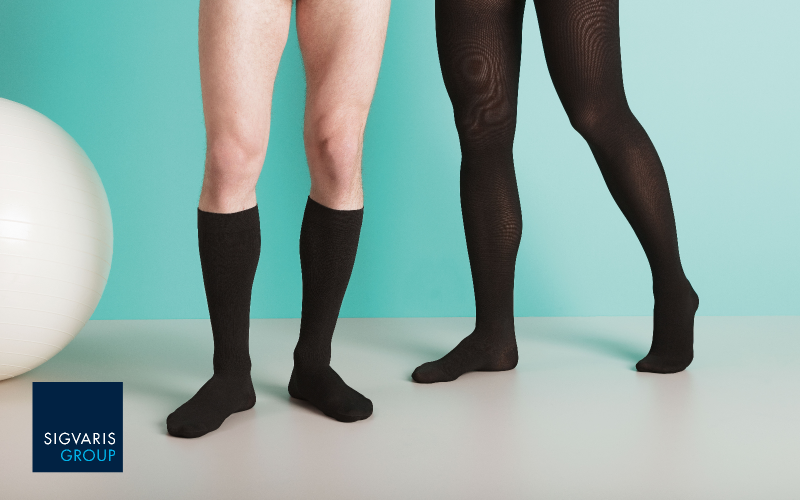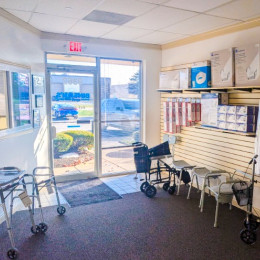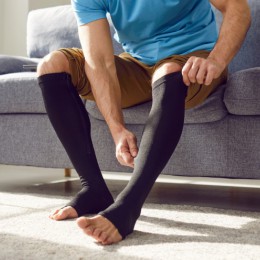
Deep vein thrombosis (DVT) is a condition where a blood clot forms in one or more of your deep veins. It most often affects the leg veins, but it can also occur in other parts of the body.
Common symptoms include:
- Swelling or pain in one leg
- Redness or warmth on the skin overlying a vein
- Tingling or numbness in the affected area
What causes DVT?
Deep vein thrombosis is usually caused by a combination of different underlying conditions, such as:
Restricted movement
Blood flow in the veins is slowed down when you are inactive for long periods of time, such as when you are sick or after surgery, or if you travel long distances by car or plane.
Infections or inflammation
Infections and inflammation can promote thrombus formation by affecting the lining surface of a vein, causing damage to the vessel wall and increasing coagulability.
Injury
Blood clots can occur when the wall of a blood vessel is damaged. This may cause the vessel to narrow or become blocked, which can lead to a blood clot forming. Narrowing or blockage of blood vessels can be caused by injuries such as broken bones or severe muscle damage.
Blood clots form more easily than normal
DVT risk is increased with certain conditions, including cancer, lung disease and heart disease. Thrombophilia--a genetic condition where the blood has an increased tendency to clot--is another factor that can increase the risk of DVT.
Pregnancy
Deep vein thrombosis (DVT) is a rare condition in pregnancy, although pregnant women are three to four times more likely to develop thrombosis than non-pregnant women of the same age. A clot can form at any stage of pregnancy, up until six weeks after giving birth.
Diagnosis of DVT
DVT can be diagnosed with a simple ultrasound scan that is painless and risk-free. A blood test may be performed to measure the level of D-dimers, which are signs of recent clotting. Early diagnosis and treatment greatly reduce your risk of serious complications.
Complications of DVT
There are several complications that can arise from DVT. These include:
- Pulmonary embolism - A blood clot travels to the lungs, where it can block blood flow and cause serious problems.
- Post-thrombotic syndrome (PTS) - This occurs when the vein becomes damaged by a DVT, making it hard for blood to flow through it normally. PTS can cause pain in your legs and swelling in your ankles or feet. It may also make you more likely to develop another clot in the future if you have a genetic predisposition toward clotting disorders like Factor V Leiden mutation or protein C deficiency, which is why these conditions are considered "clotting disorders" rather than just "blood clots."
Can I prevent a DVT?
DVT is an uncommon occurrence that can develop into serious and potentially fatal conditions. Certain risk factors increase the likelihood of developing DVT. These risk factors are cumulative--the more you have, the greater your risk. In addition, once you have had a DVT event, there is a high likelihood that another clot will form in your veins.
You and your doctor can work together to identify high-risk situations, and then develop strategies to reduce that risk. Some of the most effective measures for preventing deep vein thrombosis (DVT) include:
- Get regular exercise. Exercise helps keep your heart healthy and lowers your risk of developing deep vein thrombosis (DVT)
- Avoiding sitting for long periods of time (for example, during long car rides or flights)
- Eat a well-balanced diet that includes plenty of fruits, vegetables and whole grains. It may also be helpful to limit foods high in fat or salt because these can put extra strain on your body's circulatory system.
- Quit smoking
- Wear graduated medical compression stockings/socks

What are graduated compression stockings?
Your doctor may prescribe compression stockings, which provide a graduated pressure, with the strongest pressure at the ankle and less pressure at the top of the stocking/sock. Graduated compression helps prevent deep vein thrombosis (DVT) events and associated complications by improving blood flow back to the heart. The compression narrows the diameter of veins, thereby increasing speed of blood flow in veins and reducing risk of clot formation.
Risk Factors for DVT
- Family history
- Smoking
- Surgery, such as hip replacement or knee surgery, requires long periods of bed rest to recover from the operation. This can increase your risk of DVT by keeping your legs in a position where blood flow is slowed down and clots are more likely to form.
- Cancer
- Prolonged bed rest or immobility, e.g. during hospitalization
- Medication such as oral contraceptives (birth control pills), hormone replacement therapy (HRT), steroids or anti-inflammatory drugs that increase the risk of developing blood clots in the veins are also potential causes for DVT.
- Cancer treatments such as chemotherapy and radiation therapy may cause an increased risk for deep vein thrombosis because they can damage tissue in the body which increases bleeding tendencies and reduces clotting ability in patients who already have a tendency towards developing blood clots due to genetics or other reasons
Conclusion
- Deep vein thrombosis (DVT) is a blood clot that forms in the deep veins of your leg.
- DVT can be dangerous and even life-threatening if it travels to your lungs, causing a pulmonary embolism (PE).
- You're at higher risk for DVT if you have certain medical conditions or take certain medications.
- If you think you have DVT, see your doctor right away so they can diagnose and treat it as soon as possible.
If you're in need of compression stockings, Binson's carries a range of styles and brands, both prescription and over the counter. Our knowledgeable staff can help you find the right pair to fit your needs and help keep you healthy. Don't hesitate to contact us or visit one of our locations today.





anne cartier | Mar 14th 2023 @ 12:11 PM
thank you for the information.
DENNIS KUMMER | Mar 14th 2023 @ 10:31 PM
thank you